
Bulletin of the Technical Committee on Learning Technology
Scope & Guideline
Advancing the Future of Learning Technology
Introduction
Aims and Scopes
- Educational Technology Research and Development:
The journal focuses on the research and development of new educational technologies, methodologies, and pedagogical frameworks that enhance teaching and learning. - Innovative Teaching Practices:
It explores innovative teaching practices, including game-based learning, flipped classrooms, and project-based learning, to improve student engagement and learning outcomes. - Open Educational Resources (OER):
The journal emphasizes the importance of Open Educational Resources, advocating for their development, implementation, and impact on global education. - Artificial Intelligence in Education:
Research on the application of artificial intelligence in education, including the development of intelligent tutoring systems and chatbots, is a core focus area. - Metaverse and Virtual Learning Environments:
The journal investigates the role of virtual and augmented reality in educational contexts, particularly how these technologies can create immersive learning experiences. - Socially Responsible Research:
It encourages research that addresses societal needs and promotes equity and inclusion in educational technology.
Trending and Emerging
- Game-Based Learning and Gamification:
Recent publications emphasize the pedagogical benefits of game-based learning and gamification strategies, indicating a growing interest in using gaming principles to enhance student engagement. - Virtual Reality and Augmented Reality in Education:
There is an increasing focus on the application of virtual and augmented reality technologies in educational settings, highlighting their potential to create immersive learning experiences. - Artificial Intelligence and Machine Learning Applications:
The integration of AI and machine learning into educational practices is gaining traction, particularly in the development of intelligent tutoring systems and personalized learning experiences. - Impact of the COVID-19 Pandemic on Education:
The journal is increasingly addressing the implications of the COVID-19 pandemic on educational practices, including the shift to online learning and the use of technology in crisis situations. - Open Educational Resources (OER) and Future Research Agendas:
There is a growing emphasis on the need for future research agendas surrounding Open Educational Resources, focusing on their global needs and benefits in diverse educational contexts.
Declining or Waning
- Traditional Classroom Technologies:
There has been a noticeable decline in research related to traditional classroom technologies as the focus shifts towards more innovative and interactive technologies. - Static Learning Models:
Static models of learning that do not incorporate adaptive or personalized approaches are becoming less prominent, as the field moves towards more dynamic, learner-centered methods. - General Pedagogy without Technology Integration:
Research that discusses general pedagogical strategies without a clear link to technology integration is decreasing, reflecting a shift towards technology-enhanced learning. - Limited Focus on Non-Digital Learning Tools:
There is a waning interest in non-digital learning tools and materials as the journal increasingly prioritizes digital and online learning environments.
Similar Journals

Journal of Baltic Science Education
Connecting Researchers and Practitioners in Science EducationThe Journal of Baltic Science Education, with ISSN 1648-3898, is a leading academic journal published by the SCI METHODICAL CENTRE - SCI EDUCOLOGICA in Lithuania. This esteemed journal, established in 2008, has gained recognition within the educational sector, boasting a notable impact factor that places it in the Q2 category for the year 2023, highlighting its significance in advancing educational research. With Scopus rankings reflecting a commendable placement at #659 out of 1543 in the Education category, the journal serves as a vital platform for disseminating knowledge and fostering discourse among researchers, professionals, and students in the field of science education across the Baltic region and beyond. The journal’s objectives include promoting innovative educational practices, sharing empirical research findings, and contributing to the development of effective science teaching methodologies, ensuring that it remains at the forefront of academic inquiry in education.

Journal of Computers in Education
Redefining Education with Groundbreaking Digital Solutions.The Journal of Computers in Education is a distinguished academic journal published by SPRINGER HEIDELBERG, dedicated to advancing the intersection of technology and pedagogy. With an ISSN of 2197-9987, this journal has established itself as a pivotal resource for researchers and educators alike since its inception in 2019, maintaining a strong focus on innovative applications of computer science within educational contexts. Ranked in the Q1 category in both Computer Science Applications and Education, the journal demonstrates a high impact in its field, holding a remarkable position within the top 1.5% of journals in social sciences (rank #20/1543) and top 5.5% in computer science applications (rank #45/817). The journal's scope encompasses a wide range of topics including but not limited to educational technologies, e-learning methodologies, and the effective integration of computers in teaching, making it an essential source for professionals and students who are keen to explore cutting-edge research and trends. Although access options vary, the journal's commitment to disseminating quality research continues to enrich the academic landscape in Germany and beyond, nurturing the synergies between education and technology.
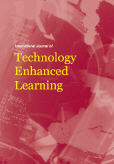
International Journal of Technology Enhanced Learning
Empowering Educators with Technology-Driven InsightsInternational Journal of Technology Enhanced Learning, published by INDERSCIENCE ENTERPRISES LTD, is a premier scholarly journal that comprehensively explores the intersection of technology and education, fostering innovative approaches to enhance learning processes. Established in 2008 and continuing through 2024, the journal is pivotal for researchers, educators, and technology professionals aiming to disseminate and engage with cutting-edge developments in technology-enhanced learning environments. With an admirable ranking in Scopus—placing in the 72nd percentile of Education and 49th in Computer Science Applications—the journal reflects a robust influence in the fields of Computer Science Applications and Education, as evidenced by its Q2 and Q3 quartile rankings. The journal not only provides a platform for empirical research and theoretical discourse but also emphasizes practical implementations in e-learning. Although it does not offer open access, its curated collection of articles serves as a vital resource for scholars and practitioners who are dedicated to advancing the nexus of technology and education.
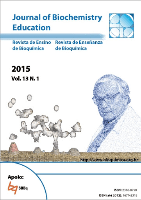
Revista de Ensino de Bioquimica
Bridging Research and Teaching in the BiosciencesRevista de Ensino de Bioquimica, published by the SOC BRASILEIRA BIOQUIMICA & BIOLOGIA MOLECULAR, stands as an essential platform for advancing the field of biochemistry education. With an ISSN of 2318-8790 and an established open access model since 2001, the journal entices a diverse audience including researchers, educators, and students who are committed to the enhancement of teaching methods and learning strategies in biochemistry. The journal is dedicated to promoting innovative pedagogical practices and fostering scholarly dialogue in order to improve educational outcomes and engagement in the biosciences. Notably based in Sao Paulo, Brazil, the journal is pivotal for disseminating vital research and insights that can assist academic institutions and practitioners globally. Readers can access a wealth of knowledge that aims to bridge the gap between biochemical research and education, ensuring the continuous evolution of the discipline.

International Journal of Technology in Education
Exploring the Future of Learning and TechnologyThe International Journal of Technology in Education, published by the International Society for Technology Education & Science (ISTES), serves as a vital platform for researchers, educators, and practitioners devoted to the intersection of technology and educational practices. With an E-ISSN of 2689-2758, this journal aims to showcase innovative research, case studies, and theoretical contributions that explore how emerging technologies can enhance teaching and learning. Although specific metrics like impact factor and HIndex are currently unavailable, the journal is committed to rigorous peer review and high academic standards, ensuring that all published work contributes meaningfully to the evolving landscape of educational technology. As an open-access journal, it strives to make research widely available, fostering collaboration and knowledge sharing among its audience. Whether you are a researcher exploring new horizons or a professional seeking practical applications of technology in education, the International Journal of Technology in Education is an indispensable resource.

E-Learning and Digital Media
Exploring the future of learning in a digital world.E-Learning and Digital Media, published by SAGE Publications Inc, is a premier academic journal dedicated to the innovative intersection of digital technologies and education. With a strong commitment to advancing research in the fields of education and computer science, this journal has established itself as a vital resource for researchers, professionals, and students alike. As of 2023, it proudly holds a Q2 ranking in both Computer Science Applications and Education, reflecting its impact and reach within the academic community. The journal encompasses a wide range of topics exploring the effectiveness and applications of e-learning technologies, pedagogical strategies, and digital media in educational settings. Since its inception in 2009, E-Learning and Digital Media has continuously contributed to the understanding and development of digital education, ensuring relevancy in an ever-evolving landscape. With an open access model intended to foster accessibility and dissemination of knowledge, this journal invites submissions that push the boundaries of traditional education through cutting-edge research and practice.
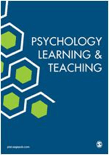
Psychology Learning and Teaching-PLAT
Unlocking potential through research-driven teaching methodologies.Psychology Learning and Teaching (PLAT) is a distinguished academic journal published by SAGE Publications Ltd, dedicated to advancing the field of educational psychology. With an ISSN of 1475-7257 and an E-ISSN of 2057-3022, this journal serves as a vital resource for researchers, educators, and practitioners seeking to explore innovative teaching methodologies and learning strategies within the context of psychology. As of 2023, its reputation is underscored by its Q1 ranking in Education and Q2 ranking in Psychology (miscellaneous), reflecting its significant contributions to the scholarly community. Placing an emphasis on empirical research and practical application, PLAT publishes research that not only enhances educational practices but also addresses contemporary psychological issues. Open access options facilitate widespread dissemination of knowledge, while its robust impact factor highlights its influence within the educational and psychological discourse. This journal is essential for anyone committed to the intersection of psychology and education, providing thought-provoking insights that inspire ongoing dialogue and development in the field.
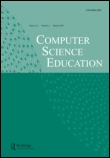
Computer Science Education
Pioneering Research for a New Era of Computer Science EducationComputer Science Education is a prestigious journal published by ROUTLEDGE JOURNALS, TAYLOR & FRANCIS LTD, focusing on the critical intersection of computer science and educational practices. Established in 1988, this journal has become a cornerstone for researchers, educators, and practitioners interested in enhancing teaching methodologies and learning outcomes in computer science. With an impressive ranking within the top quartile (Q1) in both Computer Science (miscellaneous) and Education categories for 2023, as well as high Scopus percentile placements, it underscores its significance in advancing the discipline. The journal offers a platform for innovative research encompassing diverse educational environments and approaches, and while it currently does not offer open access options, it remains committed to disseminating high-quality scholarly work. As a vital resource for anyone looking to contribute to and understand the evolving landscape of computer science education, Computer Science Education continues to shape the future of learning in this dynamic field.
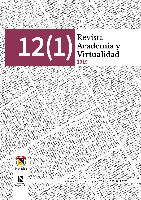
Academia y Virtualidad
Connecting Scholars to the Digital Frontier of LearningAcademia y Virtualidad is a distinguished open-access journal published by UNIV MILITAR NUEVA GRANADA that has been disseminating innovative research since 2013. Focused on the intersection of education, technology, and digital transformation, this journal aims to provide a platform for scholars, educators, and practitioners to explore the implications of virtual environments in academic settings. Maintaining a commitment to rigorous peer review and scientific integrity, Academia y Virtualidad plays a vital role in advancing knowledge within the fields of educational technology and digital pedagogy. With its accessible online format and emphasis on contemporary issues, it caters to a global audience eager to engage with the latest trends and research outcomes that shape the future of education. Researchers, professionals, and students alike will find the journal an invaluable resource for staying informed about critical advancements and theoretical discussions in virtual learning and its applications.
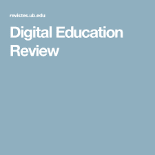
Digital Education Review
Innovating Practices for a Digital Learning EraDigital Education Review, published by the University of Barcelona, stands at the forefront of the Digital and Educational Technology field, offering a valuable platform for researchers, educators, and policymakers since its inception as an Open Access journal in 2010. With an emphasis on innovative practices and critical evaluations in digital education, the journal has garnered an impressive standing within the academic community, achieving rankings of Q3 in Computer Science Applications and Q2 in Education for 2023, alongside a notable position in the 71st percentile of Social Sciences - Education rank (447 out of 1543). The journal aims to foster interdisciplinary dialogue and disseminate research that influences educational transformation through digital means. Based in Spain, the Digital Education Review not only promotes high-quality research but also engages with a global audience, making it a pivotal resource for those dedicated to advancing the understanding of digital educational practices.